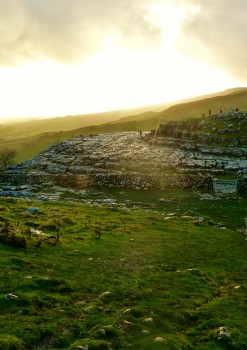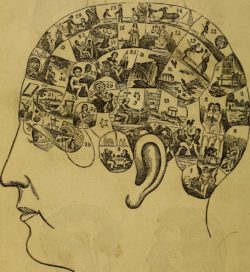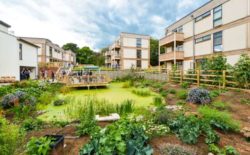Wellbeing: myth or real possibility? Café Psychologique, 24 October
Wellbeing clearly means very different things to different people: health, comfort, contentment, or even possessions or material wealth. However, it’s clear that newspapers, magazines and endless tv programmes think it’s what we need. Whether it’s bonkers celebrity diets, unfeasibly flexible lycra-clad poses, or an unnervingly superior method to switch off from the worries that assail mere mortals, it can feel like everyone has wellbeing to sell but hardly anyone seems to be able to explain what it is, and how it is genuinely attained.
So finding a translation of the vague aspirations into something tangible can be difficult, and even if that is found it often still seems completely out of reach from within the realities of busy lives, demanding work, and good intentions that stubbornly refuse to transfer into actual change.
This café will explore the nature of wellbeing and whether it is just a myth used to sell products, or actually something realistically achieveable.
The café will be introduced by Joshua Paul Malkin, who helped establish the Network of Wellbeing – a charity that promotes individual wellbeing along with community, societal and environmetal wellbeing. He grew up in Leeds, is a co-convenor of the Civil Society Forum in London and a partner in a Holistic Science consultancy called Transformation Strategies.
He will introduce this Café Psychologique on Tuesday 24 October, 8.00 pm to 9.45 pm in Seven Arts, Chapel Allerton, Leeds. The Café costs £4 on the door.
There is a poster to download here:
Café Psychologique October 2017
You can read the Café Rules here: Café Psychologique Rules
The trouble with Cancer, Café Psychologique, 26 September
Cancer is appallingly common. More than one in three people in the UK will develop some form of cancer during their lifetime. It also seems universally feared. Certainly treatments are improving all the time, and rates of survival rising, but most of us will have known of someone who has died prematurely from cancer or its effects. It holds a particular place in our psyches, as a symbol for suffering, unfairness, devastation. Even it’s treatments are feared, perceived, not always inaccurately, as being invasive, damaging and cruel. Part of this may be because cancer, the big C’, is a shorthand for over 200 different types which vary widely in their presentation, effects, how lethal they are, and how they are treated.
Awful as cancer’s effects can be on the body, it poses a massive assault on the mind too, and not just for the person experiencing cancer. It affects people in obvious ways through the fear of death and dying, the fear of suffering, the fear of physical damage and vulnerability; but it also produces a range of psychological responses, not all obvious. It’s not easy to judge how someone will respond to a cancer diagnosis. Nor is it easy to know what psychological impact there will be, even when treatment is completely successful. Some people find that as the physical treatments and support wind down, that is the point they start to experience a greater psychological challenge. Then there is the psychological impact on all the people around them, family, friends, carers and healthcare professionals. Cancer spreads not just through the body but also through the network of relationships.
This café will focus on the psychological impact of cancer on people with cancer, those around them, and those that treat them. Dr Hannah Gormley is a clinical psychologist and leads Cancer Psychological Services in Calderdale and Huddersfield NHS Foundation Trust. She will introduce this Café Psychologique on Tuesday 26 September, 8.00 pm to 9.45 pm in Seven Arts, Chapel Allerton, Leeds. The Café costs £4 on the door.
There is a poster to download here:
Café Psychologique September 2017
You can read the Café Rules here: Café Psychologique Rules
Room to Breathe, Saturday 23 September, think and talk in the Dales

The next Room to Breathe Walk is Saturday 23 September. There will be chance to think and talk with skilled facilitators, and great company, in the Dales. We walk 8 miles, have 90 minutes in structured groups, and spend the day helping each other make progress on the way ahead. There’s more information here, a booking form here and detailed information for joining the walk here.
Stretch your legs, your lungs and your mind in the Dales.
Attachment: how our connections make us who we are. Café Psychologique 25 July
Genes have an impact. A really big impact. But attachment theory is probably the most widely studied area of psychological theory for understanding the development of human personality, and understanding how that development goes wrong. Early experience of caregivers, especially in situations of stress or danger, seems critical in how we turn out.
But what if the person we turn out to be is not the person we want to be? Do we just blame our parents and caregivers and put up with it? Can we change ourselves, or is change only really possible if based on corrective experiences of healthy relationships that give us what we might have missed? And just how high are the stakes on being a parent and getting that apparently all important attachment right?
Dr Elaine McMullan is a clinical psychologist, and Rebecca Savage is a Senior Programme Manager at the National Institute for Health Research. They will introduce this Café Psychologique on Tuesday 25 July 8.00 pm to 9.45 pm in Seven Arts, Chapel Allerton, Leeds. The Café costs £4 on the door.
There is a poster to download here:
Café Psychologique July 2017
You can read the Café Rules here: Café Psychologique Rules
Growing a home together: Café Psychologique 20 June
The Psychological and Social Impact of Co-housing
A home of my own: a very current preoccupation and aspiration. So what do you do when the cost of it is beyond reach for many, and the impact of having one seems to create as much isolation and separation as the security it is supposed to provide?
Abraham Maslow identified in the 1940s that shelter is as basic a human need as air, food, water and clothing. However, the idea of individualised dwellings built around nuclear families is only one, relatively recent and fairly westernised version of achieving this. People involved in co-housing argue that it is a cheaper, more environmentally sustainable, more enjoyable and more secure a way of achieving more than just shelter. They also suggest that in seeing housing as an investment opportunity we are losing sight of its primary function of shelter, and the wisdom gained through long human experience that building houses into communities provides a more secure basis for societies.
Co-housing, as a model for this, began in Denmark in 1972 and today about 50,000 people live in co-housing in Denmark. Its popularity spread rapidly across Europe and is now emerging worldwide. Leeds is home to several co-housing projects and a new one is well underway in Chapeltown. We are fortunate to welcome Liz Lewis and Lara Eggleton from the well established Lilac project, and Pete Richardson, one of the founders of Chapeltown Co-Housing (ChaCo).
They will introduce this Café Psychologique on Tuesday 20 June 8.00 pm to 9.45 pm in Seven Arts, Chapel Allerton, Leeds. The Café costs £4 on the door.
There is a poster to download here:
Café Psychologique June 2017
You can join in the conversation online on our Facebook page: Café Psychologique
You can read the Café Rules here: Café Psychologique Rules
Hope and Friendship, Café Psychologique 23 May
Why we need hope and friendship, and how to find them
How to survive while the world goes to hell in a handcart
The world can be a tough place and maybe seems tougher than usual at the moment. That might be because of difficult personal circumstances – illness, bereavement, financial stress, pressure at work – or because headlines are dominated by Trump, Brexit, and Elections (and those are the relatively cheerful ones as compared to Syria, North Korea, climate change and global poverty).
So what will keep justifiable despair at bay; and if you believe that you do need to keep going how do you do that? Psychologists tend to agree that Hope and Friendship are two vital ingredients in helping people face and overcome difficulty, and find a way of keeping a sense of purpose and fulfillment. These seem crucial to happiness.
However, bad news and repeated setbacks militate against hope; and the powerful drive to blame and suspicion in difficult times might prompt us to withdraw from people. This café will explore how and why hope and friendship arise, often against the odds. We’ll also think about how to find hope and friendship when you feel like giving up.
Dr Nick Lalvani works in mental health recovery and will introduce this Café Psychologique on Tuesday 23 May, 8.00 pm to 9.45 pm in Seven Arts, Chapel Allerton, Leeds. The Café costs £4 on the door.
There is a poster to download here:
Café Psychologique May 2017
You can join in the conversation online on our Facebook page: Café Psychologique
You can read the Café Rules here: Café Psychologique Rules
Café Psychologique 25 April, Burnout
The effects of chronic stress, and how to slow down and recharge
Why do so many people end up burning up and worn out? Why do we become frazzled, emotionally exhausted, disengaged and depleted? What’s going on? Are we not resilient enough or are we giving too much? Why can’t we stop, slow down and recharge?
Newspaper lifestyle sections regularly feature ‘Burnout’ but swing widely between offering sympathetic tips for coping one day, and deriding so called ‘first world problems’ and exhorting readers to be more resilient and buckle down to the challenge of 21st century living the next.
In reality, the experience of burnout is likely to become a real healthcare problem if chronic stress is not addressed. Some of this might be dealt with by individuals, but it’s more often the case that social factors are creating the conditions for burnout to occur, and it can be very difficult for individuals to resist the demands of others in workplaces, universities, schools and homes.
Sally Rose is a Psychotherapist and Mindfulness Teacher from the Staff Counselling and Psychological Support Service at the University of Leeds. She will initiate an exploration of burnout as a personal and social condition, and the challenge of slowing down to regulate energy and resources.
Join the conversation at Café Psychologique Leeds, on Tuesday 25 April, 8.00 pm to 9.45 pm in Seven Arts, Chapel Allerton, Leeds. The Café costs £4 on the door.
There is a poster to download here:
Café Psychologique April 2017
You can join in the conversation online on our Facebook page: Café Psychologique
You can read the Café Rules here: Café Psychologique Rules
Art: what could it do for our thinking brains? Café Psychologique 28 March

J. G. Sprurzheim, S, R. Wells, Education: Its Elementary Principles, Founded on the Nature of Man (1872)
What does Art mean to you? And what does it mean to your brain?
Recent studies in neuroscience are making claims that art can have an impact on our brain activity. Brain scans show that under the stimulus of an aesthetic experience, blood flow to the brain increases in the medial orbitofrontal cortex, a region associated with pleasure and desire. Other studies suggest that by studying works of art, our brains learn to perceive the world in a different way, or that art helps to trigger empathy within us by activating our mirror neurons. However fascinating these scientific accounts of a neuro-aesthetic disposition within us are, they do not necessarily tell us what we are thinking. They might offer us insights into the plays of cause and effect, stimulus and sensation, or show how synaptic regions of the brain change with the study of artistic forms, but they don’t really explain how we, ourselves, make sense of and ascribe value to our own aesthetic experiences.
This session invites you to share your experiences of art. What memories, stories, anecdotes – serious, funny, complex, simple – might you share? This could be an encounter with a painting or sculpture, a particular piece of music or poetry, an exhibition or performance? It may be a conversation you have had or overheard where a work of art is trying to be understood. It could be an inner dialogue between you and the nature of your experience. How might we begin to put into words the experiences of our own thinking about art?
This is not an academic event – this is all about sharing the stories and cultivating dialogues between us…
This café will be introduced by Dr Rowan Bailey, a senior lecturer in Art and a member of the Centre for Sculptural Thinking, University of Huddersfield. Join the conversation at Café Psychologique Leeds, on Tuesday 28 March, 8.00 pm to 9.45 pm in Seven Arts, Chapel Allerton, Leeds. The Café costs £4 on the door.
There is a poster to download here:
Café Psychologique March 2017
You can join in the conversation online on our Facebook page: Café Psychologique
You can read the Café Rules here: Café Psychologique Rules
Why so defensive? How much do we really need to protect ourselves? Café Psychologique 28 February
Did you ever find yourself doing something without understanding why you have done it? Pretending something isn’t happening, being cross at someone who doesn’t deserve it, forgetting things we need to do, having unrealistic expectations: these are all everyday examples of psychological defences – the things our minds do to protect us from thoughts and feelings that are too difficult to deal with in some way.
Although the concept of psychological defence mechanisms is often attributed to Sigmund Freud, it was his daughter, Anna, who defined them in detail. In any case, at an everyday level these are ideas that are as old as civilisation. Early Daoist philosophers, Laozi and Zhuangzi, warn that the mind easily falls into traps of seeing things in black and white terms. A process later called ‘splitting’.
This cafe will look at what psychological defences are, why we have them, whether we really need them, and what to when they get out of hand.
It will be introduced by Dr Carol Martin, a clinical psychologist and psychoanalytic psychotherapist. Join the conversation at Café Psychologique Leeds, on Tuesday 28 February 8.00 pm to 9.45 pm in Seven Arts, Chapel Allerton, Leeds. The Café costs £4 on the door.
There is a poster to download here:
Café Psychologique February 2017
You can join in the conversation online on our Facebook page: Café Psychologique
You can read the Café Rules here: Café Psychologique Rules
Room To Breathe – 11 March – Open Air Thinking and Talking
The next Room to Breathe Walk is Saturday 11 March. Start the New Year with chance to think and talk with skilled facilitators and great company in the Dales. We walk 8 miles, have 90 minutes in structured groups, and spend the day helping each other make progress on the way ahead. There’s more information here, a booking form here and detailed information for joining the walk here.
Stretch your legs, your lungs and your mind in the New Year in the Dales.
Category






